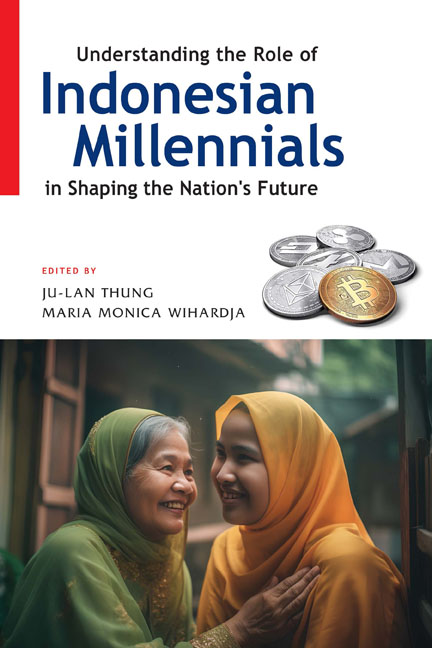Book contents
- Frontmatter
- Contents
- List of Figures
- List of Tables
- List of Annexes and Appendixes
- About the Contributors
- Introduction: Understanding the Role of Indonesian Millennials in Shaping a Nation’s Future
- 1 Generational Differences in Life Course Trajectories of Indonesians in Their Mid-twenties: Comparing Millennials and Older Cohorts
- 2 Millennials and Politics in Indonesia: 2019 and Beyond
- 3 Progressive Yet Powerless: The State of Indonesia’s Progressive Youth Organizations in the Post-Authoritarian Era
- 4 Indonesia’s Millennials and Gen Zs: Are They Financially (Il)literate?
- 5 Digital Competencies of the Millennial Generation in Micro, Small, and Medium Enterprises in West Bandung District
- 6 Millennial Muslims and “Haram Fatwas” on Cryptocurrency in Contemporary Indonesia
- 7 Youth and Religious Disaffiliation: A Study of Indonesian Millennials Learning Buddhism during Spiritual Disruption
- 8 Antagonism and Afterwards: Millennials in Indonesian Participatory Art after Reformasi
- 9 The NFT Phenomenon among Indonesia’s Millennial Artists
- Index
2 - Millennials and Politics in Indonesia: 2019 and Beyond
Published online by Cambridge University Press: 13 April 2024
- Frontmatter
- Contents
- List of Figures
- List of Tables
- List of Annexes and Appendixes
- About the Contributors
- Introduction: Understanding the Role of Indonesian Millennials in Shaping a Nation’s Future
- 1 Generational Differences in Life Course Trajectories of Indonesians in Their Mid-twenties: Comparing Millennials and Older Cohorts
- 2 Millennials and Politics in Indonesia: 2019 and Beyond
- 3 Progressive Yet Powerless: The State of Indonesia’s Progressive Youth Organizations in the Post-Authoritarian Era
- 4 Indonesia’s Millennials and Gen Zs: Are They Financially (Il)literate?
- 5 Digital Competencies of the Millennial Generation in Micro, Small, and Medium Enterprises in West Bandung District
- 6 Millennial Muslims and “Haram Fatwas” on Cryptocurrency in Contemporary Indonesia
- 7 Youth and Religious Disaffiliation: A Study of Indonesian Millennials Learning Buddhism during Spiritual Disruption
- 8 Antagonism and Afterwards: Millennials in Indonesian Participatory Art after Reformasi
- 9 The NFT Phenomenon among Indonesia’s Millennial Artists
- Index
Summary
This chapter explores the involvement of Indonesian millennials in politics and investigates the potential for their rise to disrupt the hold of the existing political elites and introduce fresh political ideas, values and practices. The analysis distinguishes between two distinct paths in millennials’ involvement in politics: rising through the political dynasty route and rising with no familial connections in politics. Millennials from political dynasties often rely on their family connections to secure positions of power, perpetuating the dominance of existing political elites and raising concerns about a political oligarchy. In contrast, millennials with no family background in politics rely on their entrepreneurial achievements or connections to religious and traditional leaders. These non-dynastic leaders offer an alternative perspective and the potential to challenge the established political order, inspiring voters and fostering a more diverse and democratic political landscape. However, significant challenges persist for millennials seeking political office. The centralized party system, where a small group of party elites control the recruitment process, presents obstacles to accessing grassroots networks. This creates a barrier to meaningful millennial participation in politics and the potential impact they can make. Creating an inclusive and democratic political environment that empowers millennials to positively shape the future of Indonesian politics requires addressing systemic challenges and preventing the domination of politics by entrenched elites and dynasties.
INTRODUCTION
Indonesia's most recent direct local elections (pilkada langsung) were held on 9 December 2020, amid the COVID-19 pandemic. Despite the pandemic, the election drew the highest voter turnout nationally, at 76.09 per cent, compared with previous direct local elections (Kompas 2021a). In addition to the complexity of holding elections amid the pandemic, the phenomenon that has received the most public attention is the emergence and victory of the millennial generation in running for regional head (kepala daerah) positions. Perludem (2021) noted that at least twenty elected regional heads and seventeen elected deputy regional heads were below 34 years of age, which means that 13.7 per cent of the regions have since been led by young millennials (those born between 1981 and 1996).
The rise of young millennials in Indonesia's local politics mirrors the wave of young millennials leading at the national level. A significant number of millennials are now in parliament as well as in the national government.
- Type
- Chapter
- Information
- Publisher: ISEAS–Yusof Ishak InstitutePrint publication year: 2024



